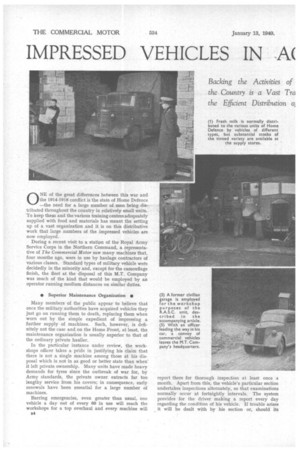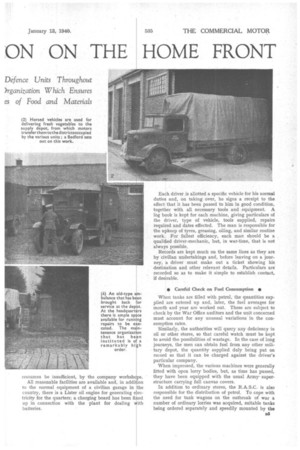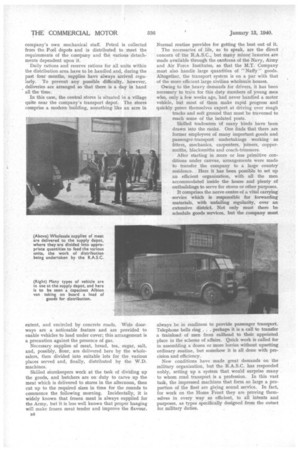IMPRESSED VEHICLES IN A( ON ON THE HOME FRONT
Page 30

Page 31

Page 32

If you've noticed an error in this article please click here to report it so we can fix it.
0 NE of the great differences between this war and the 1914-1918 conflict is the state of Home Defence —the need for a large number of men being distributed throughout the country in relatively small units. To keep them and the various training centres adequately supplied with food and materials has meant the setting up of a vast organization and it is on this distributive work that large numbers of the impressed vehicles are now employed.
During a recent visit to a station of the Royal Army Service Corps in the Northern Command, a representafive of The Commercial Motor saw many machines that, four months ago, were in use by haulage contractors of various classes Standard types of military vehicle were decidedly in the minority and, except for the camouflage finish, the fleet at the disposal of this M.T. Company was much of the kind that would be employed by an operator running medium distances on similar duties.
• Superior Maintenance Organization • Many members of the public appear to believe that once the military authorities have acquired vehicles they just go on running them to death, replacing them when worn out by the simple expedient of impressing a further supply of machines. Such, however, is definitely not the case and on the Home Front, at least, the maintenance organization is usually superior to that of the ordinary private haulier.
In the particular instance under review, the workshops officer takes a pride in justifying his claim that there is not a single machine among those at his disposal which is not in as good or better state than when it left private ownership. Many units have made heavy demands for tyres since the outbreak of war for, by Army standards, the private owner extracts far too lengthy service from his covers; in consequence, early renewals have been essential for a large number of machines.
Barring emergencies, even greater than usual, one vehicle a day out of every 60 in use will reach the workshops for a top overhaul and every machine will 134 report there for thorough inspection at least once a month. Apart from this, the vehicle's particular section undertakes inspections alternately, so that examinations normally occur at fortnightly intervals. The system provides for the driver making a report every day regarding the condition of his vehicle. If trouble arises it will be dealt with by his section or, should its resources be insufficient, by the company worksh ps.
All reasonable facilities are available and, in addi ion to the normal equipment of a civilian garage in the country, there is a Lister oil engine for generating e ectricity for the quarters; a charging board has been fi ed
,i. up in connection with the plant for dealing ith batteries. Each driver is allotted a specific vehicle for his normal duties and, on taking over, he signs a receipt to the effect that it has been passed to him in good condition, together with all necessary tools and equipment. A log book is kept for each machine, giving particulars of the driver, type of vehicle, tools supplied, repairs required and dates effected. The man is responsible for the upkeep of tyres, greasing, oiling, and similar routine work. For fullest efficiency, each man should be a . qualified driver-mechanic, but, in war-time, that is not always possible.
Records are kept much on the same lines as they are by civilian undertakings and, before leaving on a journey, a driver must make out a ticket showing his destination and other relevant details. Particulars are recorded so as to make it simple to establish contact, if desirable.
• Careful Check on Fuel Consumption •
When tanks are filled with petrol, the quantities supplied are entered up and, later, the fuel averages for month and year are worked out. These are subject to check by the War Office auditors and the unit concerned must account for any unusual variations in the consumption rates.
Similarly, the authorities will query any deficiency in oil or other stores, so that careful watch must be kept to avoid the possibilities of wastage. In the case of long journeys, the men can obtain fuel from any other military depot, the quantity supplied duly being put on record so that it can be charged against the driver's particular company.
When impressed, the various machines were generally fitted with open lorry bodies, but, as time has passed, they have been equipped with the usual Armysuperstructure carrying full canvas covers.
In addition to ordinary stores, the R.A.S.C. is also responsible for the distribution of petrol. To cope with the need for tank wagons on the outbreak of war a number of ordinary lorries was acquired, suitable tanks being ordered separately and speedily mounted by the
company's own mechanical staff. Petrol is collected from the Rxil depots and is distributed to Meet the requirements of the company and the various detachments dependent upon it.
Daily rations and reserve rations for all units within the distribution area have to be handled and, during the past four months, supplies have always arrived regularly. To prevent any possible difficulty, however, deliveries are arranged so that there is a day in hand all the time.
In this case, the central stores is situated in a village quite near the company's transport depot. The stores comprise a modern building, something like an acre in
extent, and encircled by concrete roads. Wide doorways are a noticeable feature and are provided to enable vehicles to load under cover; this arrangement is a precaution against the presence of gas.
Necessary supplies of meat, bread, tea, sugar, salt, and, possibly, flour, are delivered here by the wholesalers, then divided into suitable lots for the various places served and, finally, distributed by the W.D. machines.
Skilled storekeepers work at the task of dividing up the goods, and butchers are on duty to carve up the meat which is delivered to stores in the afternoon, then cut up to the required sizes in time for the rounds to commence the following morning. Incidentally, it is widely known that frozen meat is always supplied for the Army, but it is less well known that proper hanging will make frozen meat tender and improve the flavour.
B6
Normal routine provides for getting the best out of it.
The necessaries of life, so to speak, are the direct concern of the R.A,S.C., but many minor luxuries are made available through the canteens of the Navy, Army and Air Force Institutes, so that the M.T. Company must also handle large quantities of "Naffy " goods. Altogether, the transport system is on a par with that of the more efficient large civilian wholesale houses.
Owing to the heavy demands for drivers, it has been necessary to train for this duty numbers of young men who, only a few weeks ago, had never handled a motor vehicle, but most of them make rapid progress and quickly prove themselves expert at driving over rough tracks and soft ground that must be traversed to• reach some of the isolated posts.
Skilled tradesmen of many kinds have been drawn into the ranks. One finds that there are former employees of many important goods and passenger-transport undertakings working as fitters, mechanics, carpenters, joiners, coppersmiths, blacksmiths and coach-trimmers.
After starting in more or less primitive corr, ditions under canvas, arrangements were made to transfer the company to a large country residence. Here it has been possible to set up an efficient organization, with all the men accommodated inside the house and plenty of outbuildings to serve for stores or other purposes.
It comprises the nerve centre of a vital carrying service which is responsible for forwarding materials, with unfailing regularity, over an extensive district. Not only must there be schedule goods services, but the company must always be in readiness to provide passenger transport. Telephone bells ring. . . perhaps it is a call to transfer a trainload of men from railhead to their appointed place in the scheme of affairs. Quick work is called for in assembling a dozen or more lorries without upsetting ordinary routine, but somehow it is all done with precision and efficiency.
New conditions have made great demands on the military organization, but the R.A.S.C. has responded nobly, setting up a system that would surprise many to whom road transport is a profession. In this vast task, the impressed machines that form so large a proportion of the fleet are giving sound service. In fact, for work on the Home Front they are proving themselves in every way as efficient, to all intents and purposes, as types specifically designed from the outset for, military duties.




























































